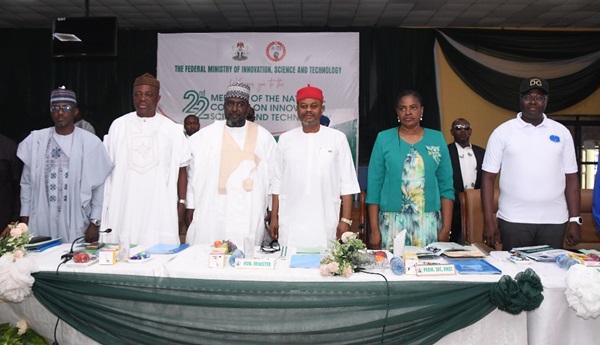
The Minister of Innovation, Science and Technology, Chief Uche Nnaji has emphasised that prosperity in the 21st Century is no longer powered solely by raw materials, but by intellectual capacity, capital, cutting-edge research, local innovation and the ability to commercialise these innovations.
He made this assertion at the 22nd edition of the National Council on Innovation, Science and Technology (NCIST) held in Abuja.
Addressing participants at the gathering, Nnaji stated that the global economic landscape is undergoing a profound transformation. Countries that were once struggling have now become technology exporters, innovation-driven economies, and startup hubs – not because of an abundance of natural resources, but because they have embraced research, development and innovation (RDI) to transform their economies.
The minister noted that this year’s NCIST theme, “Research, Develop, Innovate and Commercialise: A Circle for National Prosperity,” captures the essence of a modern, knowledge-based economy. He said it reinforces the urgency to reposition Nigeria’s development agenda on a foundation built on the RDIC cycle.
“Science, technology and innovation (STI) is the backbone of national development,” Nnaji declared. “Our ministry has the responsibility to shape the ideals that will define Nigeria’s future, drive breakthroughs, power our industries, and create solutions that will directly impact the lives of our citizens.”
He stressed the need to close the gap between researchers and relevant stakeholders, calling for the creation of a functional ecosystem where knowledge is not only pursued but applied, nurtured and translated into viable commercial solutions that benefit the nation.
Also speaking at the event, chairman of the Senate Committee on Innovation, Science and Technology, Senator Aminu Abbas stated that no country has developed without fully integrating technological advancements into all sectors of its economy. He assured that the National Assembly would continue to support the ministry and its agencies to achieve technological breakthroughs.
In a goodwill message, chairman of the House Committee on Science, Technology and Innovation, Hon. Zakariya Zannah, represented by the committee’s deputy clerk, Ukachukwu Chidiebere, urged all stakeholders to remain committed to policies and strategies that enable the seamless integration of innovation and technology across all sectors.
The Secretary to the Government of the Federation, Senator George Akume, represented by the permanent secretary of general services, Dr. Mbaeri Nnamdi remarked that Nigeria’s journey toward prosperity rests on the nation’s ability to harness knowledge and creativity to develop practical solutions that can drive industrial growth and improve the quality of life for its people.
Earlier, the permanent secretary of the Federal Ministry of Innovation, Science and Technology, Esuabana Nko-Asanye said the summit was more than a policy meeting – it was a call to action. She urged stakeholders across public, private, academic and civil society sectors to collaborate in building a dynamic ecosystem that fosters innovation and drives national progress.
“Our collective goal is to build a Nigeria that thrives on the ingenuity of its people,” she said, “and leverages its resources to solve complex national challenges such as unemployment, insecurity, climate change and economic diversification.”
A statement issued by the ministry’s head of press and public relations, Pauline Sule noted that the event also featured remarks from the Ambassador of Cuba to Nigeria, Her Excellency Niriam Morales Palmero. The envoy highlighted Cuba’s significant advancements in biotechnology, medicine and scientific research, expressing the country’s interest in strengthening bilateral ties with Nigeria in the STI sector.
“By working together,” Palmero said, “Nigeria and Cuba can unlock greater possibilities and move both nations to new heights in science, technology, and innovation.”


